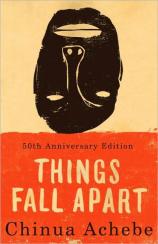Reading Group Guide
Discussion Questions
Things Fall Apart

1. The Ibo religious structure consists of chi--the personal god--and many other gods and goddesses. What advantages and disadvantages does such a religion provide when compared with your own?
2. The text includes many original African terms and there is a glossary provided. Do you find that this lends atmospheric authenticity, thus bringing you closer to the work? Do you find it helpful?
3. There is an issue here of fate versus personal control over destiny. For example, Okonkwo's father is sometimes held responsible for his own actions, while at other times he is referred to as ill-fated and a victim of evil-fortune. Which do you think Okonkwo believes is true? What do you think Achebe believes is true? What do you believe?
4. The threads of the story are related in a circular fashion, as opposed to a conventional linear time pattern. What effect does this impose on the tale of Ikemefuma? What effect does it have on the story of Ezinma?
5. The villagers believe--or pretend to believe--that the "Supreme Court" of the nine egwugwu are ancestral spirits. In fact, they are men of the village in disguise. What does this say about the nature of justice in general, and in this village in particular?
6. Our own news media pre-programs us to view the kind of culture clash represented here as being purely racial in basis. Does Achebe's work impress as being primarily concerned with black versus white tensions? If not, what else is going on here?
7. Certain aspects of the clan's religious practice, such as the mutilation of a dead child to prevent its spirit from returning, might impress us as being barbaric. Casting an honest eye on our own religious practices, which ones might appear barbaric or bizarre to an outsider?
8. In an essay entitled "The Novelist as Teacher," Achebe states: "Here then is an adequate revolution for me to espouse--to help my society regain belief in itself and put away the complexes of the years of denigration and self-abasement" (Hopes and Impediments, p. 44). In what ways do you feel that this novel places Achebe closer to the fulfillment of this noble aspiration?
9. Nature plays an integral role in the mythic and real life of the Ibo villagers, much more so than in our own society. Discuss ways in which their perception of animals--such as the cat, the locust, the python--differ from your own, and how these different beliefs shape our behavior.
10. The sacrifice of Ikemefuma could be seen as being a parallel to the crucifixion of Jesus. The event also raises a series of questions. Ikemefuma and the villagers that are left behind are told that he is "going home" (p. 58). Does this euphemism for dying contain truth for them? Do they believe they are doing him a favor? Why do they wait three years, him and Okonkwo's family to think of him as a member of the family? Finally, Okonkwo, "the father," allows the sacrifice to occur as God presumably allowed Christ's sacrifice, with no resistance. How can one accept this behavior and maintain love for the father or God?
11. Of Ezinma, Okonkwo thinks: "She should have been a boy" (p. 64). Why is it necessary to the story that Okonkwo's most favored child be a girl?
12. Of one of the goddesses, it is said: "It was not the same Chielo who sat with her in the market...Chielo was not a woman that night" (p. 106). What do you make of this culture where people can be both themselves and also assume other personas? Can you think of any parallels in your own world?
13. There are many proverbs related during the course of the narrative. Recalling specific ones, what function do you perceive these proverbs as fulfilling in the life of the Ibo? What do you surmise Achebe's purpose to be in the inclusion of them here?
14. While the traditional figure of Okonkwo can in no doubt be seen as the central figure in the tale, Achebe chooses to relate his story in the third person rather than the first person narrative style. What benefits does he reap by adopting this approach?
15. Okonkwo rejects his father's way and is, in turn, rejected by Nwoye. Do you feel this pattern evolves inevitably through the nature of the father/son relationship? Or is there something more being here than mere generational conflict?
16. The lives of Ikemefuma and Okonkwo can be deemed parallel to the extent that they both have fathers whose behavior is judged unacceptable. What do you think the contributing factors are to the divergent paths their fate takes them on as a result of their respective fathers' shadows?
17. The title of the novel is derived from the William Butler Yeats poem entitled The Second Coming, concerned with the second coming of Christ. The completed line reads: "Things fall apart; the centre cannot hold." What layers of meaning are discernible when this completed line is applied to the story?
18. The District Commissioner is going to title his work The Pacification of the Primitive Tribes of the Niger (p. 209). What do you interpret from this to be his perception of Okonkwo and the people of Umuofia? And what do you imagine this augurs in the ensuing volumes in Achebe's trilogy of Nigerian life?







